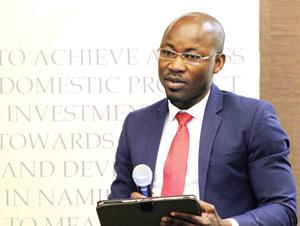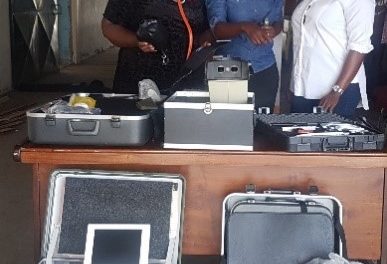
Groundwork laid to legalise GMO
Dr Eino Mvula, CEO of the National Commission on Research, Science and Technology at the opening of a recent Stakeholder Workshop on Draft Biosafety Regulations.A recent scientific workshop looked at drafting regulations to control the transfer, handling, storing and using of Genetically Modified Organisms as required by law. These regulations will from the framework within which GMOs may be legally deployed.
The National Commission on Research, Science and Technology (NCRST) last week held a stakeholder workshop on the Draft Biosafety Regulations, in Windhoek. The workshop was a follow up stakeholder workshop to review the draft biosafety regulations before submission to the Ministry of Justice for gazetting, as required by the Biosafety Act of 2006.
The workshop provided an opportunity for Namibian scientists to develop regulatory instruments which would provide for safe transfer, handling and use of living Genetically Modified Organisms (GMOs) to protect biological diversity and to make provision for the latter’s sustainable use. The regulations must take into account risks to human health, as required under the Cartagena Protocol on Biosafety to the Convention on Biological Diversity.
The science and research council said the government has long recognized the importance of biotechnology and has acceded to the Cartagena Protocol on Biosafety to the Convention on Biological Diversity adopted by the Parties to that Convention. This was followed by the enactment of the Biosafety Act, 2006 (Act no 7 of 2006), which is administered by the science council as the Competent Authority.
To comply with these legal requirements, the science and research council has established the Biosafety Council, which will work to finalise the regulations to the act. “This process of drafting of regulation is participatory and would include stakeholder consultation. Upon finalisation of the regulations, both the regulations and the commencement date will be gazetted.”
This date will also indicate the starting date that GMOs will be regulated under the Biosafety Act. “While this process is on-going, the science commission has also set in place an administrative unit to deal with regulating GMOs. “As we embark on the process of formulating these regulatory instruments, it is important that we take into consideration the view and aspiration of the Namibian people. It is our hope that participants in this workshop would also be able to come up with ideas that could reflect the aspiration of the Namibian people, while also taking into consideration the international obligations related to [legal] instruments which Namibia has ratified”, said Dr Eino Mvula, CEO of the science and research council. The council describes Biotechnology as the use of living systems and organisms to develop or make useful products, or any technological application that uses biological systems, living organisms or derivatives to make or modify products or processes for specific use. “The development of genetically modified organisms has become a contentious and most-discussed aspect of biotechnology. Modern science and technology offer tremendous opportunities for improving the well-being of people and the environment, however it also embodies risks. Therefore there is a need to ensure that adequate care is taken to inform the [people] of the benefits and processes [associated with] these innovations.”












































